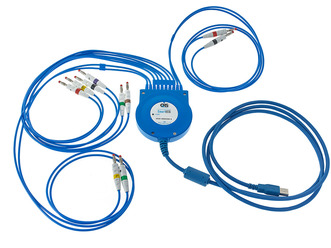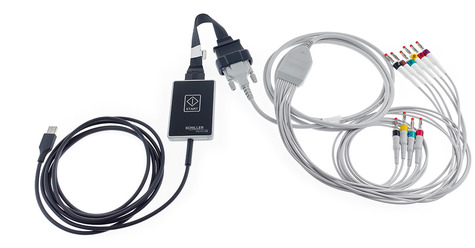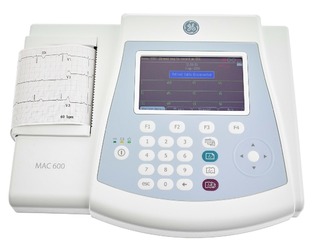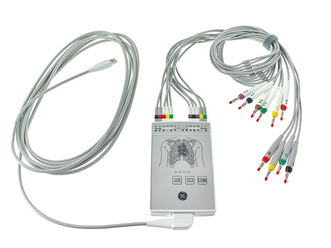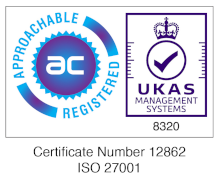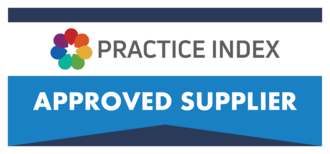 12 Lead ECG Machines & Systems
12 Lead ECG Machines & Systems
Whether you are looking for a PC based ECG system or a portable ECG machine, Numed Healthcare offer the complete package for your GP surgery or ECG clinic.
We stock leading brands including GE Healthcare, Schiller and QRS. Our 12 Lead ECG machines are fully integrated with the Optum (EMIS), TPP SystmOne and Vision NHS GP clinical system using our innovative I3 software, saving you vital time and increasing patient safety.
We offer high performance ECG monitors and include 1 year of MediServe support to make sure your service continues to run smoothly. Simple and easy to use, our ECG machines are ideally suited for both primary and secondary care.
ECG tests accurately diagnose and measure many heart disorders, plus chest pains, the extent of coronary heart disease and cardiomyopathy. They also record the electrical activity and workload of each part of the heart.
The machines are complex devices and need to be applied correctly during tests for accurate ECG readings. At Numed, we aim to provide vital support to help alongside our top-quality ECG equipment. Here are a few useful FAQs answered:
FAQs
How does an ECG machine work?
An ECG machine records the rate, rhythm and electrical activity of a heart. The heart produces electrical energy to make it contract and the ECG monitor detects these impulses and records them on a line on the screen or on paper. The graphs can be interpreted to decipher if a patient’s heart is working normally or abnormally.
For a more comprehensive look at how an ECG machine works, take a look at either our CardioSoft ECG Easy User Guide or our Universal ECG Easy User Guide.
What is the correct ECG lead placement?
The incorrect placing of leads can cause a false diagnosis. View our 12 Lead ECG Placement guide here. It explains the common position for the 10 leads on 12 lead resting ECGs.
How do you conduct a 12 lead ECG on a patient?
Watch our Geeky Medics step-by-step guide to correctly conducting and interpreting an ECG test.
How long does an ECG take?
An ECG only takes a few minutes. The test is entirely painless, however the patient will need to lie very still.
A patient doesn’t need to do any preparation before an ECG test, and they can eat and drink as normal beforehand.
What is the average price of an ECG machine?
The price of a resting ECG machine ranges between £1,500 and £3,500, depending on the features that you require.
What happens during an ECG test?
An ECG test involves attaching a number of ECG electrodes (sticky sensors) to the arms, legs and chest. The electrodes are connected by wires to the ECG machine - this picks up the electrical activity making a person’s heart beat. These signals are recorded and printed onto paper.
What are the main types of ECG?
There are 3 main types of ECG:
Resting ECG – this is carried out while a person is lying down.
Exercise ECG – this is carried out while someone is moving and exercising, either on a bike or a treadmill.
Ambulatory ECG – usually conducted over 24 hours. The electrodes are connected to a portable machine, attached at a person’s waist whilst they continue with their daily activities.
When is an ECG test usually done?
An ECG test may be done if a person has the following symptoms:
- Chest palpitations
- Pain or discomfort
- Shortness of breath or difficulty breathing
- Lightheadedness, dizziness or feeling that you may faint
- Racing heart
What do our customers say?
5 stars
“Absolutely brilliant, efficient advice and quality service. Our Cardiosoft ECG needed updating to a newer model, software upgrade and testing was done remotely, very pleased with turnaround time.”
Review by Hardeep, Practice Manager in Kent
5 stars
“Highly recommend Numed Healthcare, we have recently upgraded our Agent ECG machine to a new whizz bang affair from Numed. What a piece of kit. As per normal, the after sales care was outstanding, as was the remote installation process. Highly knowledgeable tech staff. Thank you again Numed. Keep up the good work.”
Review by Tim, Deputy Practice Manager in Bournemouth
